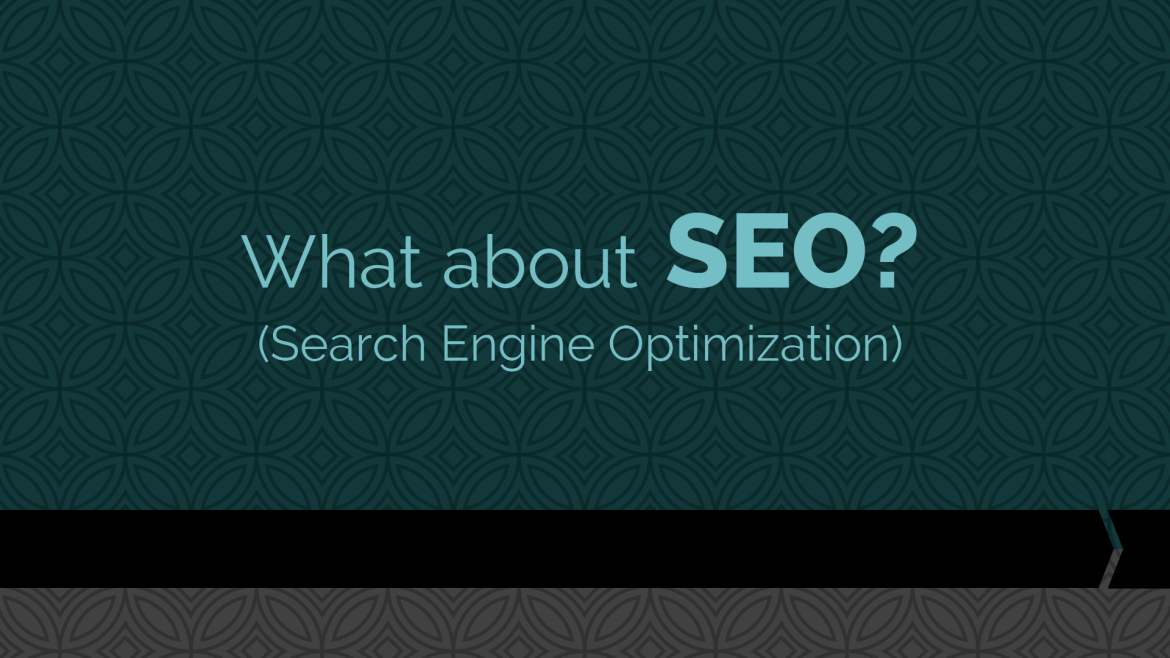Oftentimes after a website launch, we get a question about SEO – Are we doing everything we should with SEO for a particular website? That’s always a complicated answer and it varies a lot depending on the type of organization you’re working with, but for the most part we walk clients through a few general questions to make sure they can make an informed decision about whether or not to put any time or resources into SEO.
The underlying question is usually:
What do you want to accomplish with SEO?
Optimizing vs. Paid Promotion
Optimizing – included with the price of your website
In every website we build, we make sure to set things up to work well for search engine optimization from the beginning. The structure and the “guts” of the website are configured the way that Google tends to like and support. WordPress is the website platform that we use, and we always choose Google Analytics to capture visitor tracking data because then Google knows to index the site and offer it up for searches. We also try to use descriptive page titles and clear hierarchy and go the extra step to add alt image descriptions (the written description of an image that will be served up while the image loads) where it makes sense.
If clients want to go the extra mile, then we can easily install plugins like Yoast SEO in order to have more fine-grained control over any page or post’s search tags and terms.
All of these things will set up your website for success, knowing that it will move closer to the top of searches over time, if visitors locate it and find it relevant when they visit.
Paid Promotion – costs extra and monthly prices vary
We should be transparent and admit that we have paid for short-term SEO promotion for maybe 1 or 2 client websites over the years. We generally work with smaller businesses, not large mega-corporations, or huge online retailers. We typically build websites for humans, not for bots. Paying extra to show up in the top 3 of Google searches just doesn’t make financial sense to a lot of companies.
The way we like to think about SEO is to ask: If it were to work perfectly, what would it look like for SEO to help your organization? How do you imagine your potential customers interacting with your website if they find it? Can you describe the process in detail?
- What search terms do you hope people would type in to find you?
- Are the terms unique enough that you won’t be confused for some other organization? Unfortunately words like “restaurant” or “attorney” aren’t going to be very helpful unless they’re paired with something more specific and descriptive about your unique restaurant or law practice
- Do people actually search for that online? If you don’t have a product or service that people search online for, then paying for SEO may be pointless.
- If they do find you, what action do you want people to take?
- Do you have an easily identifiable call-to-action on the landing page? If not, then it’s hard to actually benefit from showing up in searches. Do you want people to call or text or book an appointment? Make sure your website and office are both set up to handle those things.
- Basic brand recognition should not be the goal for paid SEO. You need an actionable way to connect website viewers to what your organization does.
- What are your competitors doing with SEO?
- Even if you can easily answer both of the first questions, you’ll want to consider what your competitors are doing. Are they spending big bucks on SEO? If so, then no matter how much you budget, you may not make a dent in the ecosystem of online searches.
So, what do we recommend? You can’t go wrong with blogging!
The most efficient and cost-effective method for improving your Google search rankings is to post new, relevant information to your website regularly over time. Even once a month is better than most websites can manage. And the post or information does not have to be long or in-depth. Google just really likes to know that website owners are continually updating and adding to their website on a regular basis and, if they are, their Google ranking will go up over time.
If you’ve optimized your website to be SEO friendly, then blogging is the no-brainer that will pay off in the long run.
Need a blog writer? We can help.
We love being a long-term website partner with people, so that we can keep your online presence looking fresh, current, and packed with regular updates to keep human eyeballs and Google’s crawlers happy.

